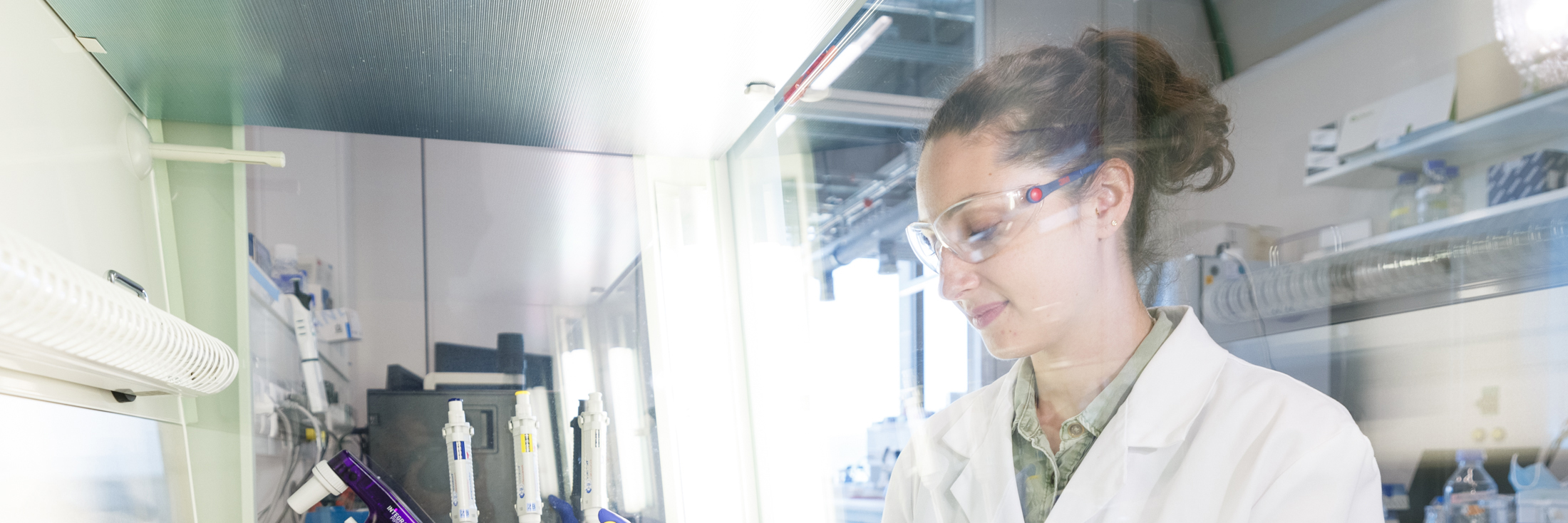Applied Cell Biology
Become an expert in Applied Cell Biology
Key data
- Degree
- Master of Science in Life Sciences
- ECTS points
- 90
- Studying mode
- Full-time and part-time
- School days
- Monday to Friday
- Teaching language
- English
- Place
- Muttenz (Basel-Land)
- Stay abroad
- optional
- Application fee
- CHF 200
The deadline for applications for the autumn semester is 30 April of the relevant year and 30 November for the spring semester.
Mobile navi goes here!
Applied Cell Biology – Career Opportunities
Applied Cell Biology focuses on specific relevant cell biology applications in biotechnology and pharmaceutical research. From single cell assays to complex tissue engineering, applied cell biology is gaining importance in both academic and industrial research. Rapid technological advances, the increasing relevance of cell-based models, and the growing need to replace animal experimentation in research in the context of the 3Rs (Replace, Refine, Reduce) will put this field in the centre of pre-clinical research. Graduates of this course will become familiar with the use of mammalian cells for assay development, for drug discovery research and for regenerative medicine.
Applied Cell Biology – Curriculum
The specialisation-specific modules will address aspects such as cell engineering for the development of high throughput assays and the use of complex microphysiological systems in the pharmaceutical industry. In addition, students will become familiar with related technologies such as cell imaging for high content screening as well as process and analysis automation for the successful industrial implementation of cell-based assays. These topics will be discussed in the context of specific industrial applications based on real-life examples and supported by theory. Modules from neighbouring specialisations, in particular Analytical Chemistry, Bioanalytics, Biotechnology, and Pharmatechnology complement the specific contents. This broad range of specialist and generic modules allows each student to create an individually tailored study programme.
The course will prepare the next generation of Applied Cell Biologists for an outstanding career in research and development laboratories in academia and industry. Moreover, students will acquire knowledge to facilitate a future career in related fields such as bioengineering, analysis, or automation for cell cultures.
The MSc study includes an eight month thesis, usually conducted at the research facilities of one of our industrial partners. Alternatively, the thesis can be carried out abroad at any institution (private or public) that meets the FHNW-scientific standards. The eight month thesis forms the basis for successful employment in industry, the medical sector or in academia.
The combination of two semesters of study with practical experience gained during the thesis qualify our alumni for stimulating and demanding positions in research and development or for doctoral studies.
Applied Cell Biology – Entry Requirements
The MSc in Life Sciences – Applied Cell Biology is especially suited for students with a BSc degree in Biology, Biotechnology, Biochemistry or related fields.
Graduates with an excellent Bachelor's degree are admitted directly if they:
- hold a Bachelor's degree in a related technical field from a university of applied sciences with a mark of A, B or ≥ 5 or an equivalent mark (≥ good)
- or demonstrate an equivalent background (BSc) and practical experience
- and have excellent English skills.
Prospective students who meet most but not all of the entry requirements are invited to an interview.


